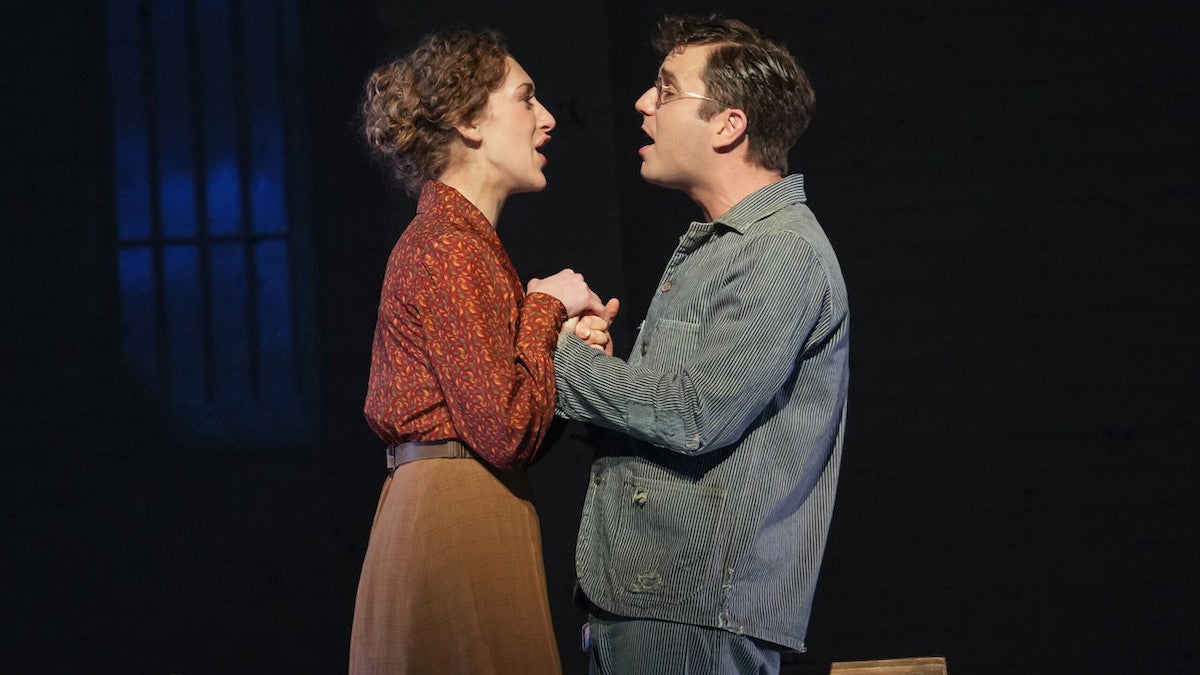
While Alfred Uhry and Jason Robert Brown’s “Parade” wasn’t ignored when it first opened in 1998 at Lincoln Center, its with its first Broadway revival, which opened Thursday at the Bernard B. Jacobs Theatre under the direction of Michael Arden, that it takes its place as one of the great American musicals.
While the hot-button period musical won the Tony Awards for best score and book 25 years ago, the prize for best musical went to the revue “Fosse.” By the time the annual awards ceremony came around, “Parade” had already closed after playing only a little over 100 performances.
Much has happened in the last quarter of a century since this historic story of a Jewish man framed for murdering a young girl in 1913 was set to music. Especially bracing today is Arden’s bold choice to feature prominently the Confederate flag in the show’s first big anthem, “The Dream of Atlanta.” At the preview I attended, a man was overheard during intermission outside the theater, announcing, “It’s the first time I’ve ever felt the breeze of a Confederate flag waving in my face! I wasn’t expecting that!” He happened to be sitting in the theater’s front row. Arden frames this bracing moment by having his Black actors stand apart and not sing, a nod to how director Bartlett Sher handled the theme of bigotry in his 2008 staging of “South Pacific” at Lincoln Center. There is also the rise of hate crimes in this century and, of course, the protest by neo-Nazis that greeted the first preview of this “Parade” only last month.
But great theater doesn’t rest on topicality alone. In the last quarter century, Broadway musicals – with a few exceptions – have grown louder and often crasser in their effects. “Parade” is a real throwback. While Brown delivers big arias and a couple of anthems, it is his smaller and more delicate moments of vocal writing that rivet our attention; that vocal beauty is what lingers longest after the last Memorial Day parade has passed.
It’s clear from the beginning that Leo Frank (Ben Platt) is innocent of the crime of which he’s accused, and his being Jewish only makes him an easy target in the Deep South. The beauty of Uhry’s book is that, once the trial for murder has begun, we begin to question Frank’s innocence ever so slightly. Key to that doubt is the gentle trio “The Factory Girls” (exquisitely sung by Emily Rose DeMartino, Ashlyn Maddox and Sophia Manicone), in which three young women in Frank’s employ at the pencil factory accuse him of making unwanted advances. Brown’s soft and dizzying score hypnotizes us into believing, for a moment, their version of events. That trial ends with Platt singing “Leo’s Statement,” in which he explains, “It’s hard to speak my heart.”
I saw Brent Carver in the original production of “Parade” and T.R. Knight in a 2009 production, directed by Rob Ashford, at L.A.’s Mark Taper Forum. I don’t recall either of those fine actors being quite as prickly and persnickety as the Leo Frank that Platt presents. He’s not a bad guy, but this man from Brooklyn has no interest in stooping to get along with the Southern yokels around. His blithe treatment of his wife, Lucille (the vocally splendid Micaela Diamond), can be described as aloof, and that would be a polite observation. Platt makes his character nebbish, but he doesn’t make him in any way likable. Until he sings “Leo’s Statement.”
Over an hour has passed before Platt sings that lament regarding Frank’s reticent personality. An hour plus is a long time to wait for the lead actor to grab our sympathy, but when the moment finally arrives, it is as revelatory as it is startling. And it is very, very quiet.
The musical’s second act unravels the lies told about Frank at the trial. Diamond makes the transition from doormat to headstrong to lead the charge to save her husband, and she and Sean Allan Krill in the role of the supportive Georgia governor carry the show to the end.
A couple of the villains in the piece might be overdrawn here, but that’s debatable. Otherwise, Arden’s direction of his cast is exemplary, and an especially poignant touch is the projection of historic photos that function to introduce their actor doppelgängers.
Above all, the fluid and often surreal staging of the Frank murder trial is an extended moment of brilliance in the theater that no musical aficionado should miss.
















